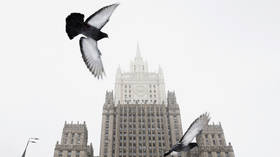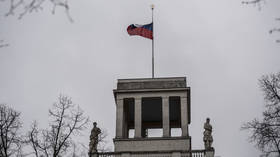Russia responds to expulsion of diplomats

Ambassadors of Austria, Belgium, Luxembourg and the Netherlands were summoned to the Russian Foreign Ministry on Tuesday and informed that a number of their diplomats had been declared personae non gratae. The move is Moscow’s response to their earlier decision to expel Russian representatives over the conflict in Ukraine.
All four ambassadors received protest notes regarding their government’s recent decision to expel Russian diplomats. Austria, Belgium and the Netherlands were informed of the number of their own diplomats who would have to leave Russia in response, while Luxembourg was let off with a warning.
Vienna’s decision to expel four Russian diplomats on April 7 was an “unfriendly act that seriously harms both bilateral relations and the international reputation of Austria,” Moscow told Ambassador Werner Almhofer, adding that four of his employees had until April 24 to leave Russia.
Belgium’s Mark Michielsen was likewise given a list of Belgian diplomatic staff who will have until May 3 to leave. Brussels expelled 21 Russian diplomats on March 29, accusing them of “espionage” and “security threats.”
Ambassador Gilles Beschoor Plug of the Netherlands was told 14 employees of the embassy in Moscow and one diplomat from the consulate-general in St. Petersburg had two weeks to leave Russia, in response to the March 29 expulsion of 18 Russian diplomats from the embassy in The Hague, the trade mission in Amsterdam, and the permanent mission to the Organization for the Prohibition of Chemical Weapons (OPCW).
Moscow told Plug it was “unacceptable” for the Netherlands to abuse its privilege as the host nation of the OPCW.
Georges Faber, ambassador of the Grand Duchy of Luxembourg, was handed a protest note over his government’s decision to expel a Russian diplomat, and told Moscow will reserve the right to respond.
The US and many of its NATO allies have been expelling Russian diplomats since March, alleging they were spies and citing the “invasion” of Ukraine.
Russia attacked its neighboring state in late February, following Ukraine’s failure to implement the terms of the Minsk agreements, first signed in 2014, and Moscow’s eventual recognition of the Donbass republics of Donetsk and Lugansk. The German- and French-brokered protocols were designed to give the breakaway regions special status within the Ukrainian state.
The Kremlin has since demanded that Ukraine officially declare itself a neutral country that will never join the US-led NATO military bloc. Kiev insists the Russian offensive was completely unprovoked and has denied claims it was planning to retake the two republics by force.













